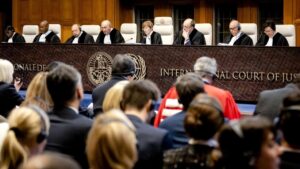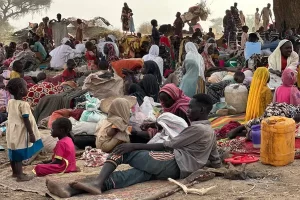Sudan has cut all diplomatic relations with the United Arab Emirates, accusing the Gulf nation of supporting paramilitary forces in the country’s devastating civil war. The announcement came just days after the International Court of Justice dismissed Sudan’s genocide case against the UAE.
Sudanese Defense Minister Yassin Ibrahim declared the UAE a “state of aggression” during a televised address Monday, citing recent drone and missile attacks on Port Sudan that he claimed were carried out using Emirati-supplied weapons. Sudan has recalled its ambassador from Abu Dhabi and ordered the closure of the UAE embassy in Khartoum.

“We can no longer remain silent while foreign actors violate our sovereignty and support those who destroy our nation,” Ibrahim stated.
The diplomatic break follows nearly two years of civil conflict between the Sudanese Armed Forces (SAF) and the Rapid Support Forces (RSF), which has killed over 24,000 people and displaced nearly 13 million since April 2023.
Relations between Sudan and the UAE have deteriorated steadily since December 2023, when Sudan expelled 15 Emirati diplomats and canceled a $6 billion port development deal over allegations of UAE support for the RSF.
Sudan’s effort to hold the UAE accountable suffered a setback last month when the International Court of Justice dismissed its genocide case, citing lack of jurisdiction and insufficient grounds under the Genocide Convention to proceed.

The immediate trigger for cutting ties appears to be recent RSF attacks on Port Sudan, the last major city under government control. The strikes targeted critical infrastructure including the airport, maritime port, fuel depots, and power facilities.
Aid organizations warn the situation threatens humanitarian operations. “Continued assaults on Port Sudan will collapse the only functioning aid corridor left in the country,” a senior Médecins Sans Frontières official said. The United Nations has temporarily suspended operations in the area, endangering millions who depend on humanitarian assistance.

The UAE has firmly rejected Sudan’s accusations. An Emirati Foreign Ministry spokesperson called the claims “baseless and politically motivated,” insisting that the UAE “has supported peace and humanitarian relief in Sudan from the outset.”
Despite these denials, analysts point to satellite imagery, leaked intelligence, and battlefield reports that continue to raise questions about UAE involvement, though conclusive evidence remains elusive.
The diplomatic rupture could have far-reaching consequences for regional stability and Sudan’s economic future. Experts suggest the move might deter other foreign investors, further isolating the war-torn country economically.
“This move signals a shift in Sudan’s foreign policy toward exposing and confronting external interference,” said Dr. Amal Hassan from the African Centre for Strategic Studies. “But it could also risk alienating regional powers Sudan might need in post-war reconstruction.”
With humanitarian access shrinking and no political solution in sight, Sudan’s decision marks a new phase in the country’s effort to highlight what it views as harmful foreign intervention. The development puts additional pressure on the international community to push for a ceasefire and sustainable peace process in one of Africa’s worst ongoing humanitarian crises.



